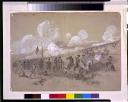Camp Clark, Washington
July 14th, 1861
My Dear Sarah,
The indications are very strong that we shall move in a few days – perhaps tomorrow. Lest I shall not be able to write to you again, I feel impelled to write a few lines that may fall under your eye when I shall be no more. Our movement may be one of a few days duration and full of pleasure – and it may be one of severe conflict and death to me. Not my will, but Thine O God be done. If it is necessary that I should fall on the battlefield for my Country, I am ready. I have no misgivings about or lack of confidence in the cause in which I am engaged, and my courage does not halt or falter. I know how strongly American Civilization now leans on the triumph of the Government and how great a debt we owe to those who went before us through the blood and suffering of the Revolution, and I am willing – perfectly willing – to lay down all my joys in this life, to help maintain this Government and to pay that debt. But, my dear wife, when I know that with my own joys I lay down nearly all of yours, and replace them in this life with cares and sorrows – when after having eaten for long years the bitter fruit of orphanage myself, I must offer it as the only sustenance to my dear little children – is it weak or dishonorable, while the banner of my purpose floats calmly and proudly in the breeze, that my unbounded love for you, my darling wife and children, should struggle in fierce, though useless, contest with my love of country?
I cannot describe to you my feelings on this calm summer night, when two thousand men are sleeping around me ,many of them enjoying the last, perhaps, before that of death – and I, suspicious that Death is creeping behind me with his fatal dart, am communing with God, my country and thee.
I have sought most closely and diligently, and often in my breast, for a wrong motive in thus hazarding the happiness of all those I loved and I could find none. A pure love of country and of the principles I have often advocated before the people and “the name of honor that I love more than I fear Death” have called upon me and I have obeyed.
Sarah, my love for you is deathless, it seems to bind me in mighty cables that nothing but Omnipotence could break. And yet my love of Country comes over me like a strong wind and bears me irresistibly on with all those chains, to the battlefield.
The memories of all the blissful moments I have enjoyed with you come creeping over me, and I feel most grateful to God and you that I’ve enjoyed them so long. And how hard it is for me to give them up and burn to ashes the hopes of future years, when, God willing, we might still have lived and loved together and seen our sons grow up to honorable manhood around us. I have, I know, but few and small claims upon Divine Providence, but something whispers to me – perhaps it is the wafted prayer of my little Edgar – that I shall return to my loved ones unharmed. If I do not, my dear Sarah, never forget how much I love you, and as my last breath escapes me on the battlefield, it will whisper your name. Forgive my many faults, and the many pains I have caused you. How thoughtless, how foolish I have often times been! How gladly would I wash out with my tears every little spot upon your happiness and struggle with all the misfortunes of this world to shield you, and your children, from harm. But I cannot. I must watch you from the Spirit-land and hover near you, while you buffit the storm, with your precious little freight, and wait with sad patience, till we meet to part no more.
But O Sarah! if the dead can come back to this earth and flit unseen around those they loved, I shall always be near you – in the garrish days and darkest nights… amidst your happiest scenes and gloomiest hours – always, always, and if there be a soft breeze upon your cheek, it shall be my breath, or if the cool air fans your throbbing temple, it shall be my spirit passing by. Sarah, do not mourn me dead – think I am gone and wait for thee – for we shall meet again.
As for my little boys, they will grow as I have done, and never know a father’s love and care. Little Willie is too young to remember me long, and my blue eyed Edgar will keep my frolics with him among the dimmest memories of his childhood. Sarah, I have unlimited confidence in your maternal care and your development of their characters, and feel that God will bless you in your holy work. Tell my two mothers, his and hers, I call God’s blessing upon them. O Sarah, I wait for you there! Come to me and lead thither my children.
Sullivan
The original Sullivan Ballou letter to his wife is not extant. Several versions of the letter exist. The above relies on Robin Young’s For Love & Liberty: The Untold Story of Major Sullivan Ballou & His Famous Love Letter, which cites as its source for the letter the Rhode Island Historical Society.




















Recent Comments